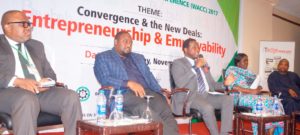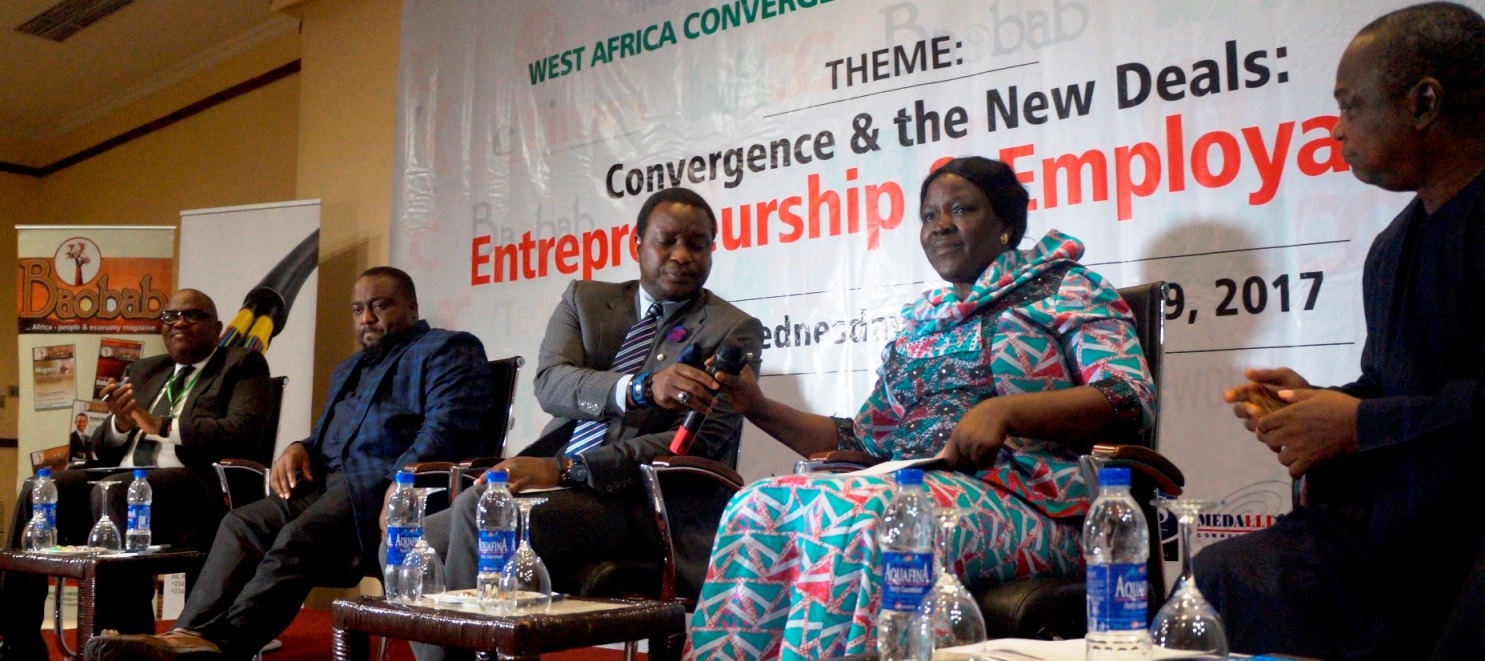General Electric (GE), Nigeria, has released a whitepaper titled “The Future of Work in Nigeria. Bridging the Skills Gap: The Key to Unlocking Nigeria’s Inherent Potential” as part of the company’s global ‘The Future of Work’ series to highlight the need for investment in sustainable skills development. In this 2017 issue, GE commissioned a survey of four key industries – Oil and Gas, Transportation, Healthcare and Power – for insight from their key leaders, including CEOs, HR and operations directors, on the impact of skills shortage on their businesses, as well as the ways to address skills shortages.
The new GE report profoundly echoes the submission of the panel in the Session on ‘Convergence and the Future of Work’ at the 9th West Africa Convergence Conference (WACC 2017) that held recently in Lagos and organised by Lagos based media company: Knowhow Media and Market Intelligence International Limited KMMIIL.
The panel which include Dr. Sola Afolabi, Chairman of Qitech Technologies Limited; Country General Manager for IBM Nigeria, Mr. Dipo Faulkne; Director General of Administrative Staff College of Nigeria (ASCON), Dr. C.U. Gayya; System Manger at Cisco Nigeria, Mr. Kaecy Udumukwu and MD/CEO of Resource Intermediaries Limited, Mr. Olusoji Oyawoye, had submitted that while technology convergence was helping to create new jobs and careers as well expand the portfolio of opportunities for skill trainings across industry verticals, government appears lagging in policy and vision to prepare the new generation of young people for today’s workplaces.

The panel on ‘Future of Work’ at WACC 2017. L-R: Country General Manager for IBM Nigeria, Mr. Dipo Faulkner; System Manager at Cisco Nigeria, Mr. Kaecy Udumukwu and MD/CEO of Resource Intermediaries Limited, Mr. Olusoji Oyawoye, Director General of Administrative Staff College of Nigeria (ASCON), Dr. C.U. Gayya; and Dr. Sola Afolabi, Chairman of Qitech Technologies Limited
An expanding economy and technology dynamics will require new competences, and enhanced skill sets that right policy thrusts could help address. “Skills development that is aligned with industry requirements is a catalyst that can ensure economic growth; and skills adequately channeled at meeting changing dynamics of an industry or an economy imply ability to foster new careers that can contribute positively to the economy,” said Chairman, House Committee on ICT, Federal House of Representatives, Nigeria, Hon Mohammed Ogoshi Onawo, in his keynote at the 9th West Africa Convergence Conference (WACC) with the theme: ‘Convergence & the New Deals: – Entrepreneurships & Employability,’
According to Lazarus Angbazo, President and CEO of GE Nigeria: “Competing in the 21st century global economy requires advanced skills development strategies and policies robust enough to adjust to changes in the economic landscape and the associated demands for skills. GE is committed to building a world that works better. We are committed to building skills to meet critical needs and fill skills gaps domestically and globally. Our aim is to achieve success by building collaboration, increasing employability, and engaging the public sector and business community.
“We understand that there is no one-size-fits-all approach to skills development. Indeed, it varies across countries and sectors. However, what is constant is the need for both the public and private sector to come together to ensure that the education system- from traditional structures, to vocational and new approaches are producing the necessary skills for the country’s current needs while anticipating its skills needs in the future.”
The report highlighted quality education as crucial to Nigeria’s future socio-economic development and emphasized the strain as a misalignment between current curriculum and industry needs places on the country’s infrastructural development, while recommending dialogue as a first step and public-private partnerships as a key driver in enhancing the quality of education.
The Vice President of Nigeria, Professor Yemi Osinbajo who wrote the preface for the report stated that, “Nigeria faces a Herculean task in plugging its skills gap. As the economy grows and new technologies emerge, the demand for skilled, competent and technical employees will only grow. Much of the emphasis needs to be placed on educational resourcing and policy reform – issues that sit predominantly with government and donors. But, the private sector has both a vested interest and a role to play in supporting the development of talent and the widening of the skills base in Nigeria.”
A strong example of GE’s commitment to skills development in Nigeria is the Lagos Garage, a hub for advanced manufacturing-based innovation, strategy development, idea generation and collaboration. Co-located with the GE Lagos offices in Victoria Island, the permanent installation of the Lagos Garage, launched in 2016, offers a year-round series of skills training programs focused on building the next generation of Nigerian entrepreneurs.
Till date, 141 entrepreneurs have graduated the program having been trained to use the latest in advanced manufacturing technologies; 3D printers, CNC mills, and laser cutters as well as in business development. 100+ prototypes have been developed at the Garage with over 40 ideas being transformed into practical business models. About $1m+ in funding has been secured by graduates of the program and 12 alumni businesses have won prestigious awards both home and abroad.
The WACC holds annually as an industry-sponsored event. Sponsors for WACC 2017 include: National Information Technology Development Agency (NITDA), National Automotive Design and Development Council (NADDC), Qitech Technologies Ltd, Galaxy Backbone Limited, PFS Limited, and Medallion Communications Limited, NigComSat Limited and Smart Web.
































